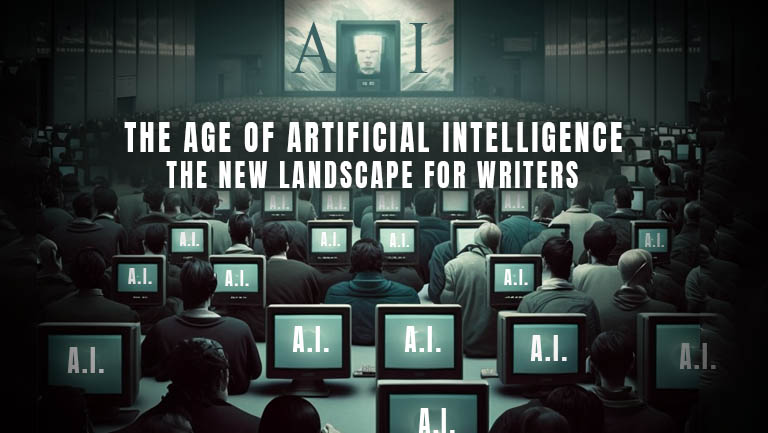Age of AI: The New Landscape for Writers

AGE OF AI
As the world continues to evolve, technology keeps transforming the way we work and live. One significant development in recent years is the rise of artificial intelligence (AI). For writers, this new technology has brought both apprehension and excitement. The question on many writers’ minds is, “How will AI change the way we work?” In this blog, we will explore the impact of AI on the writing profession and discuss the opportunities and challenges it presents.
AI-powered writing tools
With AI-powered writing tools becoming more sophisticated, writers can leverage these platforms to improve their writing process. Grammar checkers, style analyzers, and AI-driven editors can all help writers enhance their work, allowing them to focus on the creative aspects of their craft. By embracing these tools, writers can streamline their workflow and produce higher-quality content. Here is a video about 7 great AI writing tools.
AI-generated content
AI has progressed to the point where it can generate content that is coherent and contextually relevant. This development has sparked a debate about the role of human writers in the age of AI. While some fear that artificial intelligence will replace human writers, others argue that it will merely shift the nature of their work. For example, writers may be tasked with editing and refining AI-generated content, ensuring that it aligns with the desired tone, style, and message.
Artificial Intelligence For Collaboration
Collaborative writing Another potential outcome of AI’s impact on writing is increased collaboration. Writers and AI systems can work together to produce content that combines the strengths of both parties. This symbiotic relationship allows writers to draw on AI’s capacity for data analysis and pattern recognition while maintaining the human touch that makes stories compelling and relatable.
Niche and specialized content
As artificial intelligence becomes more adept at generating content, the demand for niche and specialized writing skills will likely grow. Writers with expertise in specific industries or subjects will be highly sought after, as their unique knowledge and perspective will be difficult for AI systems to replicate. This shift could also lead to a greater emphasis on personal branding and the development of a writer’s distinct voice.
Ethical considerations:
The rise of artificial intelligence in writing raises important ethical questions. Issues like plagiarism, content manipulation, and authorship attribution will require careful consideration from writers, editors, and publishers. Establishing guidelines and best practices for using AI in writing will be crucial to maintaining the integrity of the profession.
In conclusion, while AI’s impact on the writing profession is undeniable, it is not necessarily a threat. Instead, it presents writers with new challenges and opportunities for growth. By embracing artificial intelligence and adapting to the changing landscape, writers can continue to thrive in the age of artificial intelligence. Ultimately, the key to success will be striking the right balance between leveraging AI’s capabilities and maintaining the human touch that makes writing such a powerful form of communication.
Follow our new blog about all things Tech and AI. Mac a freelance writer and video maker delves into tech that makes jobs easier for creators.
You may also be interested in: Top jobs for writers that pay the bills.



